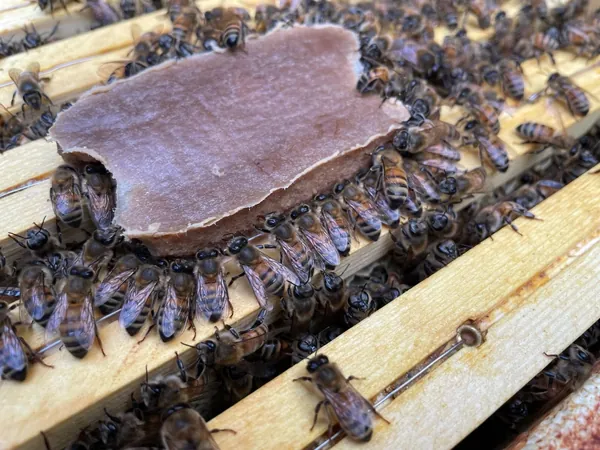
Revolutionary Food for Honey Bees: A Lifeline for Our Pollinators
2025-04-16
Author: Rajesh
In a groundbreaking development for beekeeping and agriculture, scientists have introduced a game-changing food source engineered to sustain honey bee colonies even without natural pollen.
Published in the renowned journal *Proceedings of the Royal Society B*, the collaborative research from Washington State University and Belgium's APIX Biosciences reveals that honey bee colonies under nutritional stress thrived when fed this innovative diet during crucial crop pollination in Washington.
This new food, designed like human "Power Bars," is packed with essential nutrients that honey bees require. It’s poised to become a vital strategy to combat the alarming decline of bee populations—an issue that directly threatens global food supply chains that rely on bee pollination.
In a world where urban development and climate change are rapidly depleting natural food sources for bees, the importance of this innovation cannot be overstated. Brandon Hopkins, a leading expert on pollinator ecology at WSU, noted, "Honey bees are generalists and need a variety of nutrients, but their traditional food sources are often scarce due to changing environments."
Dr. Patrick Pilkington of APIX Biosciences highlighted the novelty of this breakthrough, stating, "For the first time, honey bees can be sustained on a man-made feed—this is a monumental step in beekeeping." He believes this feed could redefine honey bee management practices by significantly improving colony health.
The journey to this discovery was no easy task; it took over a decade of extensive research and collaboration among several teams. Thierry Bogaert, the study's lead author, praised the dedication of the scientists at APIX and their partners, emphasizing that thousands of ingredient combinations were tested to achieve the perfect balance for honey bee diets.
A particularly crucial finding in the research is the inclusion of isofucosterol, a natural nutrient found in pollen that is essential for bees' survival. Colonies that consumed this enriched feed managed to survive an entire season without regular pollen, while those that did not suffered severe setbacks including reduced larval growth and even complete collapse.
To ensure the new food's effectiveness, WSU conducted field tests on nutritionally stressed colonies placed in blueberry and sunflower fields—areas notorious for poor pollen quality. The results were promising: colonies fed the new diet flourished, showcasing significant growth compared to those relying on standard feed.
As beekeepers struggle with high mortality rates in their colonies, this innovation arrives at a crucial time. Pilkington remains optimistic about its future impact, stating, "We aim to make this product available to American beekeepers by mid-2026, and we are collaborating with the beekeeping community to implement its use effectively in agricultural practices."
With the looming threat of colony collapse and rising pressures on beekeepers, this revolutionary food source could be the lifeline that saves not just our honey bees, but also the vital ecosystems they support.



 Brasil (PT)
Brasil (PT)
 Canada (EN)
Canada (EN)
 Chile (ES)
Chile (ES)
 Česko (CS)
Česko (CS)
 대한민국 (KO)
대한민국 (KO)
 España (ES)
España (ES)
 France (FR)
France (FR)
 Hong Kong (EN)
Hong Kong (EN)
 Italia (IT)
Italia (IT)
 日本 (JA)
日本 (JA)
 Magyarország (HU)
Magyarország (HU)
 Norge (NO)
Norge (NO)
 Polska (PL)
Polska (PL)
 Schweiz (DE)
Schweiz (DE)
 Singapore (EN)
Singapore (EN)
 Sverige (SV)
Sverige (SV)
 Suomi (FI)
Suomi (FI)
 Türkiye (TR)
Türkiye (TR)
 الإمارات العربية المتحدة (AR)
الإمارات العربية المتحدة (AR)